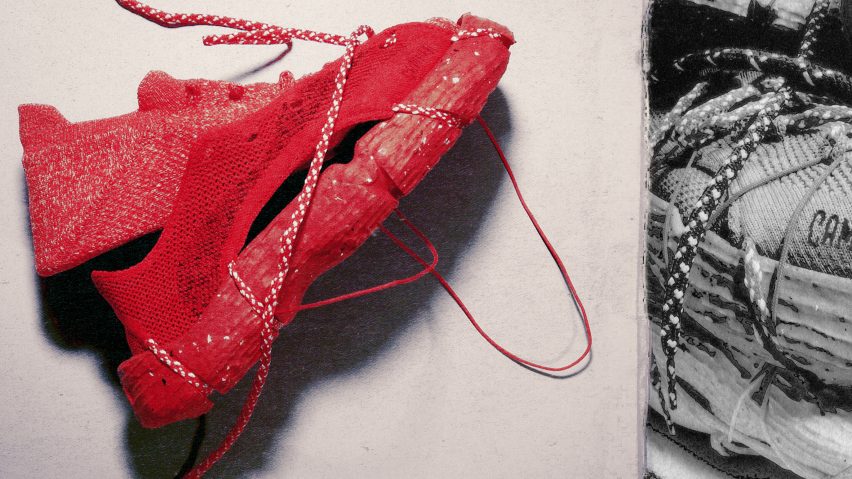Sportswear brand Camper has released the Roku modular trainer, which is formed of six parts that can be easily assembled and disassembled.
Envisioned as "a minimal shoe with a minimum environmental impact", the Roku trainer was designed so that its individual components could be simply replaced and recycled.
The trainer is being sold fully assembled and as individual components.
"Looking back at where we started, there was more of a to-do list than a visual moodboard," Camper lead designer Eliška Horčíková told Dezeen.
"We wrote down some key points around circularity and then I started making small prototypes on my own to test different ways of how to construct and disassemble shoes without any glue, so we can repair or clean and then disassemble and recycle the shoe or its pieces," she continued.
"Very soon, we found out that the shoe needed to be made from the least parts possible. Each piece needed to be made with the minimum manual labor, considering zero waste during the production as well."
The core idea for Roku was that it could be assembled and disassembled at home, meaning none of the components could be glued together. Instead, the pieces are tied to each other with elastic bands and overlong laces.
"We wanted to design a shoe that was simple enough to assemble and disassemble so the customers could do it themselves," said Horčíková.
"One of the key challenges for any modular shoe is how to connect each part, especially certain pieces that must be extremely well joined together, without glue but then still be able to easily separate them later," she continued.
"We worked with the essentials: how can the weight of the person wearing the shoe help to form that connection? What form and shape of the outsole and upper can support the connection? How can we minimize the amount of components and maximise the durability, quality and comfort?"
Each of the six components was designed using materials that allow it to perform its specific function.
"It might sound like a cliche, but the truth is that the shape follows its function here," explained Horčíková.
"The outsole part is robust for its construction. There is an inner footbed inside the knitted sock, which needed a certain volume and density, and then there is a capsule outsole, which also needed a certain volume so we could have the cuts for the laces that fix the shoe together."
"We knew we wanted something with a simple and understandable construction," she added. "But then we were also aiming for a bold and unique silhouette, which would represent the unisex attitude Camper stands for."
The trainer components can be returned to Camper as part of its Take Back program, which allows the brand to control how the shoes are disposed of. Users who send back shoes through the program get a discount on new purchases.
Horčíková believes that modular footwear is one way for the shoe industry to reduce its environmental impact and that Roku can also help to educate people wearing the trainers about circularity.
"It is important to say that there are more approaches and solutions for circular and sustainable footwear," she said. "You can find other examples in our collection actually. Kobarah and Tossu are mono-material products you can easily recycle already as they are."
"The modularity and all that comes with it is more complex. I believe it is a call to the client to be more proactive here. At first, being conscious of not using glue so the shoe can be repaired or recycled piece by piece after usage."
She also believes that the customisation allowed by the trainer's modularity may help people build a stronger connection with their shoes and therefore keep them longer.
"Having the option of making their own shoe I think creates some emotional or nostalgic connection with the product, so they are likely to take more care of it and wear it longer and more," said Horčíková.
Camper is not the only brand aiming to reduce the impact of its footwear. Nike unveiled its modular glueless ISPA Link trainers in 2022, while shoe brand Vivobarefoot and material science company Balena recently developed a prototype trainer that is 3D-printed from compostable materials.
Last year Allbirds created the "world's first net-zero carbon shoe" using regenerative wool.

